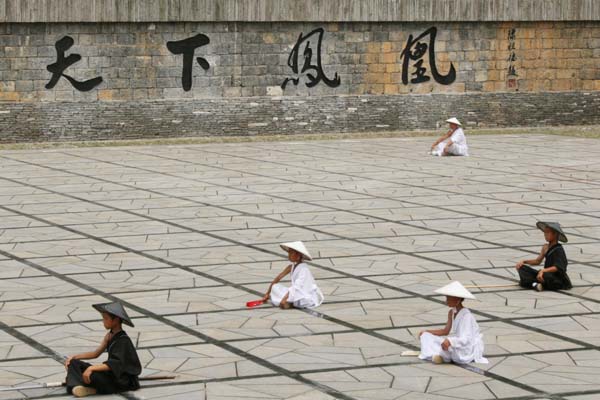Walking chessman
|
Some 200 martial arts practitioners dressed in black and white act as the chess stones and move across the board in sync with the ongoing game. [Photo: CRIENGLISH.com] |
The final match of the 2009 International Weichi Tournament took place at the Southern Great Wall in China's ancient town of Phoenix on Saturday. Chinese player Guli and South Korean Lee Sedol, both of the highest professional ranking, went head-to-head in the complex strategic board game similar to chess.
Now in its fourth year, the event drew numerous weichi fans and media from home and abroad, not only because it pitted two top players against each other, but also for the special location and unique interpretation of the game.
Guli and Lee Sedol, both 26 and the most promising players on the international weichi stage, have been dubbed the "rivals of each other's lifetimes," for they are now 9:9 in their previous eighteen matches.
They played in a pavilion high on the Southern Great Wall, far from any disturbances, while audiences followed the game on a giant plaster chessboard on the ground. Some 200 martial arts practitioners dressed in black and white acted as the chess stones, moving in sync with the ongoing game.
For added entertainment value, the living chessman, most of them teenage boys, performed Kungfu along with the players' moves. Among them, four foreign participants attracted the most attention. David from England has been in China for more than two years. He said it was a fantastic idea to combine the game with martial arts and that he is proud to have participated, even though he has only been practicing Kungfu for two months. Although weichi is not as popular in Western countries as Chinese Kungfu, it is an essential part of Chinese culture, he said.
Weichi originated in China more than 2,500 years ago. Legend has it that Chinese emperor Yao (2337-2258 BC) had his counselor Shun design the game for his son to teach him discipline, concentration and balance. Compared to chess, weichi has simpler rules and more flexibility in time and space as it starts with an empty board where players can place stones at any position. However, it is rich in strategic complexity for its many possibilities.
Weichi is widely played in Asian countries, especially China, South Korea and Japan. Chinese weichi fans are quite familiar with South Korea players as they often compete in matches organized between the two countries.
Lee Sedol is known for his risky and offensive techniques while Guli is known as a strong player for his steady manner.
By the end of Saturday's game, Lee Sedol had overtaken Guli by two and a half stones.
However, to most of the spectators, the result seems almost unimportant.
Luping, an amateur weichi player from Henan, said he most enjoyed the process of the match. Besides, he said, "you rarely get a chance to play weichi at such a serene and beautiful place. The features of the Southern Great Wall match perfectly the spirit of weichi."
With a total length of 190 kilometers, the Southern Great Wall was built some 1,615 years ago and had the same defensive function as the Ming Dynasty Great Wall in North China. Bordering Hunan and Guizhou Provinces, it is one of the most visited scenic spots in the region.
Although in ancient times the Southern Great Wall was used for military purposes, modern people admire it for its grandiosity and for the creativity of those who built it. Snaking through the green mountains, it symbolizes not so much the uproar of ancient wars as the transcendence of time.
Hosting a weichi match on the Southern Great Wall is a tribute to the game's historical roots and also promotes it in modern times, explained Ye Wenzhi, president of Unitenix, a travel corporation that manages tourism in Phoenix and sponsored the event.
 0 Comments
0 Comments








Comments